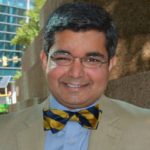 Senior Scholar
Senior Scholar
Email: saurabh.vishnubhakat@yu.edu
Saurabh Vishnubhakat is a Senior Scholar at C-IP2, a Professor of Law and Director of the Intellectual Property & Information Law Program at the Benjamin N. Cardozo School of Law, and a Research Fellow at the Duke Law Center for Innovation Policy. He writes and teaches on intellectual property, administrative law, civil procedure, and remedies, especially from an empirical perspective.
Professor Vishnubhakat’s research has been cited in federal appellate and trial court opinions, agency reports and rulemaking, and over two dozen Supreme Court briefs. His work has been published in leading law journals including the Washington & Lee Law Review and Iowa Law Review, in peer-reviewed journals including the Journal of Law and the Biosciences and the Journal of Economic Perspectives, and in the intellectual property and technology journals of the Harvard, Yale, Columbia, Berkeley, and Duke law schools. His first book, A Tort Theory of Patent Litigation: History and Reform, is under contract with Cambridge University Press.
Until 2022, Vishnubhakat was a professor at Texas A&M University, where he held tenured joint appointments in the School of Law and the Dwight Look College of Engineering, and guest-lectured in the Mays Business School. Before coming to Texas A&M, he served in the United States Patent and Trademark Office as principal legal advisor to that agency’s first two chief economists. He was also a faculty fellow at the Duke Law School, where he co-taught patent law, and was a postdoctoral associate at the Duke Center for Public Genomics, where he researched law and policy issues surrounding innovation in genetics and biomedicine.
Professor Vishnubhakat holds a J.D. and LL.M. in intellectual property from the University of New Hampshire School of Law, formerly the Franklin Pierce Law Center, where he was an editor of the Law Review. He also holds a B.S. in chemistry from the Georgia Institute of Technology. He is admitted to the bars of Texas, Illinois, the U.S. Court of Appeals for the Federal Circuit, and the Supreme Court of the United States.

